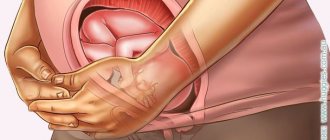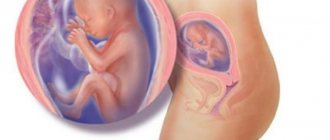The appearance in the stomach of a woman carrying her first baby of weak intensity rhythmic tremors is always accompanied by the emergence of many anxieties. She cannot understand what it is, what is the reason for their appearance. It begins to seem to her that the baby is trying to tell her that he is not feeling well.
Every woman should know that such tremors that occur in the second half of pregnancy indicate the development of a new reflex called hiccups in the baby.
An exact answer to the question of why a child hiccups in the stomach has not yet been found, however, doctors have some assumptions about this.
What causes hiccups?
The most important thing you need to know about your baby’s hiccups is that this is normal, both, for example, at 31 weeks, and earlier or later. Some mothers feel specific movements, reminiscent of hiccups, even in the middle of pregnancy. However, most often, hiccups occur in the fetus closer to 34 weeks, or even 36 weeks of pregnancy. And this is due to the fact that the baby is getting bigger, his activity is more noticeable to the mother through the walls of the abdomen, and also due to the fact that the child is maturing.
Exact knowledge of the reasons why children hiccup is not yet available. Most likely, this is one of the many stages of preparing the fetus for further independent life, one of the stages of its gradual development. It happens that a child often hiccups in the womb and this begins to bother the pregnant woman. Is everything okay with the baby? Shouldn't urgent measures be taken to ensure his health? In order not to worry in vain, you need to familiarize yourself with the possible prerequisites for the occurrence of hiccups:
- Swallowing amniotic fluid;
- Preparation of the respiratory system;
- Hypoxia.
A baby in the womb often swallows the water it is in. Amniotic fluid ensures the safety of the child and provides him with a nutritious environment. Studies of the behavior of children in the womb have shown that when glucose is added to the amniotic fluid, the fetus's swallowing movements become more frequent and greedy. In other words, the child tastes the waters around him and recognizes their taste. By 38 weeks he can swallow about 500 ml of amniotic fluid per day! Fluid can enter and exit the lungs through contraction of the diaphragm, which causes hiccups.
If a growing organism hiccups several times a day from 37 weeks onwards, this may indicate almost complete maturation of the respiratory organs (diaphragm, lungs) and their training for further life outside the womb. Such preparation does not cause danger or discomfort for the baby.
But what worries expectant mothers is the likelihood of intrauterine oxygen starvation. Hiccups do not necessarily indicate fetal hypoxia, but if it is particularly debilitating, long-term, or for some reason bothers and worries the pregnant woman, it is better to see a doctor and undergo the necessary examinations. From 30 weeks, CTG can be prescribed - cardiotocography, showing the baby’s heart rate. And at 32 weeks, a routine ultrasound is usually prescribed, the data of which can confirm or refute the presence of hypoxia. Moderate hypoxia can be corrected, which inspires hope and cannot but rejoice.
How to tell if your baby is hiccupping
For those who have not encountered manifestations of intrauterine hiccups, it is difficult to imagine what sensations the mother experiences and what this phenomenon looks like. How can you tell if your baby is hiccupping in his stomach? Hiccups may look like:
- rhythmic vibrations;
- short tapping and twitching;
- monotonous jolts or clicks.
Often a woman guesses on an intuitive level that the sensations she experiences are precisely the baby’s hiccups. It is impossible to predict the frequency and duration; for some it is 1 minute, for others it is an hour, once a week or many times a day. However, there is some correlation between hiccups and a pregnant woman’s consumption of sweet foods.
How to understand?
It is very easy to understand that a child is hiccupping. To do this, you need to listen to your stomach. When a baby hiccups in the womb, the mother experiences the following symptoms:
- The baby's rhythmic shuddering is felt. In this case, the child’s motor activity is absent.
- Tremors are felt that occur at regular intervals. This can happen over a long period of time.
- The mother hears a steady tapping sound.
- There is a ticking sensation on one side of the abdomen or a strong pulsation in the lower abdomen.
- If you place your hands on your stomach, you will feel a slight vibration.
The baby often hiccups in the stomach during pregnancy from 30 weeks onwards. The duration of hiccups may vary. There are no specific time limits for the duration of the process. Everything is purely individual. Some babies may hiccup for a couple of minutes, while others may hiccup for an hour or more. Normally, the frequency of attacks ranges from one to seven times a day.
Ultrasound studies on this topic have shown that the embryo begins to hiccup for several minutes a day already at the age of eight weeks. But during this period, the expectant mother does not notice this. And only from 20-24 weeks of pregnancy a woman begins to feel the baby’s hiccups.
How to help yourself if hiccups bother you?
At 33 weeks, the birth date is still quite far away, and it would be logical to get some sleep ahead of the sleepless nights with the new baby. But a pregnant woman’s peace is disturbed either by a pressed and quickly filling bladder, or by anxieties and worries associated with the upcoming birth and drastic changes in life. And if the baby also decided to be more active at night and decided to hiccup, what should he do then? Here the mother may be concerned not only about his well-being, but also about her own comfort.
What to do if a baby hiccups in the womb? If the baby is healthy and his hiccups do not bother his mother, then nothing. But when prolonged tremors bother you and prevent you from falling asleep, you should try to reconsider your diet and avoid eating sweets in the evening and before bed, because eating them can provoke contractions of the baby’s diaphragm.
When hiccups occur during the daytime, you can try other remedies. Changing body position, adopting a pose on all fours, and walking in the fresh air are effective. In addition, the mother’s physical activity, healthy sleep and a balanced diet serve as a prevention of that very hypoxia that no one wants to face.
Many mothers talk to babies in their tummy - at the behest of their hearts or in accordance with the recommendations of specialists, it doesn’t matter. The child in the womb is able to distinguish voices, sounds, and is sensitive to touch. If hiccups or excessive activity at an inopportune hour disturb the mother’s peace, you can gently talk to the child, put your hand on his stomach, and stroke him. Even if the baby does not calm down immediately, you will establish contact with him and calm down yourself. Remember that hiccups at any stage - both at 20 and 35 weeks - are absolutely normal.
During the day, your baby in the womb makes so many different movements. Fortunately, the expectant mother feels only a tenth of her baby’s actions. In the third trimester of pregnancy, you should count at least ten movements per day. But how different are they, these sensations are so different: the baby put out his arm, or maybe it’s his leg? And now it's drumming right on your stomach. However, you may also experience very strange movements. They sound like rhythmic tapping or twitching that can last for more than half an hour. Definitely, every expectant mother will be concerned about such unusual behavior of the baby, but when she finds out the reason, she may smile - the baby is hiccupping in the stomach! Yes Yes. He really hiccups! This is very touching, but how do you know if this is dangerous for the baby? And also why does this happen?
Baby often hiccups in the stomach - should I worry?
The opinions of experts on this matter are very different. Almost everyone agrees that hiccups in the womb are absolutely safe for a baby. So, it seems there is nothing to worry about. However, there is a group of doctors who believe that if a child hiccups in the stomach, then perhaps he has hypoxia or Subsequently, the same experts reassure mothers that this is not the main symptom. Still, if a child hiccups in the stomach, and this is accompanied by sharp and rather painful tremors, then you should consult a doctor who is monitoring your pregnancy. Most likely, he will prescribe an ultrasound. These results can confirm or exclude the possibility of hypoxia. Practice shows that 96% of babies who hiccupped while in their mother’s tummy were born without any signs of hypoxia.
in a stomach?
There are various assumptions on this topic. In fact, the process of hiccups is a rhythmic contraction of the diaphragm, which is provoked by a “clamp” of the nerve that connects the brain. In this case, it gives a signal to the diaphragm to release it with pushes. This is exactly what happens when a baby hiccups in the stomach. There is no need to worry about this. After all, once this process occurs, it means that the process of formation of the central nervous system in your baby is complete. There are other opinions on this matter. They say that the baby hiccups while in the stomach if he accidentally swallowed more amniotic fluid than usual, and the expectant mother herself is to blame for this because she overused sweets. The child also liked the taste, so he swallowed it, and then had to push out the excess. Experts say that through hiccups, a child learns to swallow and breathe independently, training his lungs and diaphragm.
What to do if your baby hiccups in his stomach?
Doctors do not have any instructions on this matter. Hiccups do not cause any particular inconvenience to the baby himself. For him, it is as natural as breathing or yawning for you. And to reduce your discomfort, try going out into the fresh air or changing your position, stroking your tummy and talking to your baby. The main thing is not to worry, just get used to your sensations, communicate more with your baby, because soon he will no longer hiccup in his tummy, but in your arms.
The most long-awaited and memorable moment of the entire pregnancy is the first movement of the baby. But the closer the beginning of the third trimester, the more often a woman encounters new active movements. Every pregnant woman wonders what their baby is doing at the moment when these rhythmic movements are felt in the abdomen. And they are very surprised when they find out that their baby learned to hiccup while in utero. But you can find out why a child hiccups in the stomach by reading our informative article.
What causes hiccups
There are many assumptions about the frequent hiccups of children in the womb. However, which are valid and which are not is unknown. Let's name some of them.
Swallowing small amounts of amniotic fluid
During the feeding process, the amniotic fluid surrounding the baby enters its mouth, then passes into the esophagus, then into the stomach. In some cases, which will be discussed below, it penetrates the baby’s respiratory tract. As a result, the air present inside the baby’s body pushes the water out. As a result, a spasm of the diaphragm occurs. As a result, it is reduced.
Watch the video: A clear example of a baby hiccupping in the tummy
If too much liquid gets into the baby's body by swallowing, he will first regurgitate it, and then begin to hiccup in the womb. This is a normal process. He will develop it due to overeating after he is born.
Reasons for the fetus swallowing a huge amount of amniotic fluid:
- pleasant taste of amniotic fluid . He begins to feel it after 20 weeks. The taste changes depending on what mom ate. So, if she eats a lot of sweets, the amniotic fluid will acquire a sweetish taste. If the baby likes it, he will begin to actively swallow water. A huge flow will provoke irritation of the diaphragm, as a result of which hiccups will occur;
- yawning _ This is an innate reflex. During it, the baby, like an adult, opens his mouth wide. As a result, amniotic fluid easily enters his esophagus. This is considered the main reason why a child hiccups in the womb.
Development of the sucking reflex
In the later stages, the baby begins to make sucking movements. Thus, a reflex arises on which the baby’s nutrition after birth depends. As a result, during the sucking process, the fetus also swallows amniotic fluid, and the mother begins to feel hiccups in the tummy.
Trying to breathe
The baby hiccups in his stomach as he tries to breathe. At 35 weeks, the baby's respiratory organs begin to prepare to function outside the womb. The baby sometimes makes breathing movements, as a result of which amniotic fluid enters the nasopharynx and passes further along the respiratory tract.
Uncomfortable position in the womb
Hiccups can be triggered by strong physical pressure. It is carried out if the mother:
- sits leaning forward;
- in a dream she turned over on her stomach, as a result of which pressure arose on it;
- crosses legs;
- raises hands up;
- wears a bandage belt.
Due to this effect, the respiratory and digestive organs of the baby are deformed. Therefore, it is difficult for air to escape from them.
Usually, hiccups due to this reason occur in the last trimester. By this time, the baby is already becoming quite large in size and because of this, it becomes very crowded in his mother’s tummy.
Immaturity of the nervous system
The human central nervous system is an apparatus that is formed in the womb, however, after birth it does not immediately become perfect, but continues its development for several more years. While in the tummy, the baby reacts to any influences from the outside world. It could be:
- loud noise;
- bright light;
- experience of severe emotional states by the mother;
- sudden movements.
It is under the influence of all these reasons that babies in the stomach constantly hiccup. Because of their influence, the impulses sent by the nervous system to all organs fail. It is to them that a spastic reaction appears.
Hypoxia
This is the most dangerous reason why a child often hiccups in the womb. Due to lack of air, the fetus often produces convulsive breathing movements.
What sensations arise
When hiccups occur, a woman feels slight spasms that are different from other normal fetal movements. The sensations a woman feels when her baby hiccups can last a few minutes or last a long time. Depending on the stage of pregnancy at which you feel your baby's first hiccups, your feelings may vary. The tremors become more distinct as the baby grows inside the abdomen.
Pregnant women describe the following sensations when their baby hiccups:
- Pulsation in the lower abdomen on the left or right
- Monotonous tapping.
- Twitching, discomfort in the lower abdomen.
- Periodic tremors.
- Vibration of the abdominal skin.
Throughout pregnancy, it is necessary to monitor the baby’s hiccups in order to provide information about fetal movements until the right moment. Some women in the second trimester experience movements that resemble muscle spasms. Starting from the fifth month, the woman feels the powerful blows of the active little tenant. All this information must be recorded in a special table, according to which the doctor will determine the activity of the fetus and identify possible problems.
Possible reasons
You don't need to urgently call your doctor asking why your baby is actively hiccupping in his stomach. Gynecologists recommend not to worry, because this process is considered natural. Just relax and enjoy the feeling of your baby moving inside you. The phenomenon of hiccups in the fetus during pregnancy occurs regularly. Doctors still don’t have a consensus on what causes a baby’s hiccups.
- Assumption No. 1. Compression by the umbilical cord or diagnosis of hypoxia. When the hiccups are intense and repeat daily, the doctor prescribes an ultrasound scan. This is necessary to prevent the possible entanglement of the umbilical cord around the fetus's neck, which limits the flow of oxygen, interferes with breathing and increases not only the baby's increased movement, but also hiccups. If the doctor's fears are confirmed, then compression by the umbilical cord leads to uneven growth of organs and subsequent restriction of blood flow to the fetus.
- Assumption No. 2: Children, while still inside their mother, learn to use their lungs to swallow incoming oxygen through the umbilical cord. While breathing, your baby may swallow some amniotic fluid (amniotic fluid). Fluid entering the lungs sends a signal from the central nervous system to the brain, which causes the diaphragm to contract rhythmically. Therefore, in order to get rid of amniotic fluid that has entered the lungs, children begin to hiccup.
- Assumption No. 3. Sucking reflex. Another hypothesis under which hiccups may appear in the fetus is the development of the sucking reflex. This skill is necessary for the child for future breastfeeding and emotional calm. While thumb sucking in the womb, the baby involuntarily also swallows amniotic fluid, which causes hiccups. The presence of this process in a baby indicates good development of the central nervous system.
Brief conclusions
The development of the baby throughout all trimesters of pregnancy directly depends on the woman’s health, her nutrition, and compliance with the gynecologist’s recommendations. If, starting from the very beginning of pregnancy, all the indicators in the expectant mother’s tests are normal, she eats properly and receives all the necessary vitamins, then the development of the fetus is usually not in danger.
If a child hiccups in his mother’s stomach, according to experts, he does not feel pain or discomfort. Usually, hiccups are not a warning sign and do not threaten the development of the fetus. In most cases, it can be considered as an individual trait of an individual child. After all, some of the babies, while in the womb, actively push their legs into the stomach, some of them “want strawberries in the middle of winter,” while others simply hiccup. But only an examination and consultation with a specialist will help to accurately determine whether the child’s development corresponds to the norm.
Pregnant girls are suspicious. Any signals from the body during pregnancy cause concern. In the last trimester of pregnancy, the expectant mother is also concerned about too frequent movements of the fetus, and vice versa, the absence of tremors for a long time. Fetal hiccups in the womb raise many questions for the expectant mother. To find out whether this is normal, you need to find out the causes of the attacks and understand in what situation anxiety is appropriate.
What to do if your baby hiccups often
If hiccups are not repeated regularly, then this phenomenon should be treated calmly, as a normal process of fetal development. But why does a child constantly hiccup in his stomach and what to do about it? First you need to visit a doctor for additional examinations. Only timely medical care will help eliminate developmental defects and ensure the birth of a healthy baby. An examination by a gynecologist consists of the following diagnostic methods:
- In-person consultation - a specialist will conduct a visual examination and ask clarifying questions about the frequency and duration of fetal hiccups.
- Cardiotocography – this test will help measure, feel and hear the child’s heartbeat. If the device detects a rapid heartbeat, the doctor diagnoses the possibility of hypoxia.
- Ultrasound with Doppler - these measurements allow you to assess the state of blood circulation through the vessels of the umbilical cord, the fetal aorta and identify possible dysfunctions of the placenta. If blood flow is reduced, this can become a symptom and sign of hypoxia in the newborn.
Before visiting the doctor, try other effective ways to reduce your child's hiccups. Feeling active movements, tremors in the abdomen, try to relax, stop being nervous and rest more. To reduce your baby's hiccups during pregnancy, we recommend following these recommendations:
- Walking outside every day will help calm your baby's activity.
- When your baby's hiccups prevent you from sleeping all night, change your sleeping position by turning over on your other side or back.
- Get on your knees, focusing on your elbows. Hold this position for a few minutes and then repeat.
- By hiccupping, a baby can show that he is cold. To do this, cover your stomach with a warm blanket.
- Remember to do constant breathing exercises: take a slow, deep breath, and then exhale for 10 seconds.
When a doctor's help is needed
If your baby hiccups during pregnancy, this is absolutely normal. If he hiccups rarely and not for long, then there is no need to worry.
However, if he often hiccups in the stomach during pregnancy, you need to be wary. Here are the main points when the help of a gynecologist is needed:
- if the child hiccups for a long time and moves a lot;
- if the baby stops moving.
In such cases, the doctor will conduct a special diagnosis, which will include a visual consultation, examination of the baby’s heartbeat with instruments and ultrasound with Doppler measurements.
All these procedures will show whether there is hypoxia and if it is detected, the doctor will take certain measures.
- To exclude the diagnosis of hypoxia, the doctor will determine the functional state of the fetoplacental system using CTG (fetal cardiotocography);
- In addition, you need to pay attention to your lifestyle: walk in the fresh air, eat well and give up bad habits; this will help, in case of a disorder, to minimize oxygen starvation of the baby.
Remember! The norm is to hiccup no more than three times a day and no more than one hour. At the same time, the movements do not increase, the baby behaves as before, and you do not experience any discomfort.
Video: How a child hiccups in his stomach
When you feel the baby’s first hiccups in your stomach, try to relax and not worry about it. This process happens to every pregnant woman, but occurs at different times. To understand what a baby’s hiccups inside the abdomen look like, we suggest watching the video. It clearly shows the rhythmic movements and kicks of the baby in the womb of the expectant mother.
Found an error in the text?
Select it, press Ctrl + Enter
and we will fix everything!
Pregnancy is a special period for every expectant mother. Over the entire 9 months, she experiences a lot of new feelings and emotions, gets to know the baby even before his birth, feeling how he moves inside, turns over and pushes. Along with joys come experiences. All of them mainly concern the well-being of the child, who has not yet been born, but is only preparing for this. From the article you will learn why a baby hiccups in the stomach of a pregnant woman, how to identify hiccups and whether it is a cause for concern.
Dangerous manifestations
Hypoxia does not develop independently: it occurs against the background of pathological reactions occurring in the placenta. The disease may occur due to anemia. In this case, the cells and tissues of the body do not receive enough oxygen and essential nutrients. For the purpose of prevention, it is necessary to treat diseases associated with the respiratory system in a timely manner. Otherwise, the course of pregnancy will become more complicated and this dangerous disease will arise. Myocardial infarction and congenital heart defects lead to oxygen starvation. Due to these ailments, microcirculation in tissues is disrupted. Note that hypoxia can occur in women with pathology of the placenta and umbilical cord.
Oxygen starvation is dangerous for a pregnant woman, but more so for a baby. If the disease occurs in the early stages, the child begins to develop developmental abnormalities. If hypoxia occurs in the later stages, the baby’s adaptive capabilities will be impaired. In children with hypoxia, the central nervous system is often affected. The disease must be detected in the early stages. The expectant mother needs to pay attention to the duration of the baby’s hiccups, as well as how he behaves. If you feel something is wrong, consult a doctor and get tested.
To make a diagnosis, cardiotocography will be required: the procedure allows you to monitor the baby’s motor activity. Other examination methods reveal his heart rate. Ultrasound helps to study the composition of amniotic fluid. In addition to these methods, procedures to examine the placenta and umbilical cord may be necessary. Hypoxia leads to serious consequences. To prevent this disease, you need to spend more time in the fresh air and lead a healthy lifestyle.
A large number of expectant mothers, having felt that the child is hiccupping in the stomach, first experience joyful emotions, and then begin to fear for the health of their baby. Hiccups, according to many experts, in most cases are a natural process, indicating that the child’s nervous system is fully formed and its development is proceeding at the proper level. Is it normal for a child to hiccup in the stomach? We will try to answer this question that interests many people in this article.
What is hiccups in a pregnant woman's stomach?
How to determine fetal hiccups?
The expectant mother can easily recognize the baby's first movements. Perhaps at first she does not realize that her feelings are the baby’s movements, but the more time passes, the more clearly she can be convinced of this. The child may noticeably push, turn and even hiccup. This happens around 20-26 weeks of pregnancy, when his nervous system has already formed. Hiccups - contraction of the diaphragm - can be recognized by the following signs:
- a feeling of pulsation or slight vibration, which are localized mainly on the right or left in the abdomen;
- rhythmic repetition of “tapping” at regular intervals;
- small twitches that feel like cramps.
In order not to confuse hiccups with tremors, you need to listen to your own feelings. It always has a certain rhythm, a push follows a pause at regular intervals.
By the way, the fact that a child may hiccup in his stomach does not mean that all children do this. Some pregnant mothers may never experience such sensations, while others experience them several times daily.
Sometimes the expectant mother feels the baby’s hiccups not from the side, as happens most often, but coming from the lower abdomen. Many people think that this is a sign that the baby has rolled over and is in a head-down position. If the hiccups are definitely felt from above, then in most women this gives rise to an unreasonable fear of the breech presentation of the fetus. In fact, the position of the child cannot be determined by this sign, because hiccups are a contraction of the diaphragm, it can be felt anywhere in the pregnant woman’s abdomen.
When can you feel a baby's hiccups?
A distinct feeling of baby hiccups in the stomach or the absence thereof can be explained by the following reasons:
- if the mother is thin and does not have a sufficient supply of subcutaneous fat, then she will feel the hiccups very clearly;
- increased and decreased sensitivity are the main reasons why hiccups will be somewhat noticeable;
- when the placenta is located on the anterior wall, the expectant mother begins to feel hiccups much later than the 26th week of pregnancy or does not feel them at all.
Hiccups of a child in the stomach of a pregnant woman:
begins from intrauterine oxygen deprivation, ingestion of amniotic fluid or pinching of the vagus nerve
How to detect fetal hiccups in the abdomen. Reasons for its appearance
In late pregnancy, there are rhythmic strange sensations in the abdomen, completely different from movements.
- Hiccups manifest as rhythmic movements of the diaphragm;
- From about 24 weeks of pregnancy, when the respiratory and nerve centers are already well developed, you can hear the baby hiccupping.
How can you tell if your baby is hiccupping during pregnancy? To do this, you need to listen to your feelings. Fetal hiccups can be identified by movements very similar to short, regular shudders.
By listening to your belly, you can describe hiccups with the following sensations:
- rhythmic shuddering without motor activity of the baby;
- the same interval of shocks over a long period of time;
- measured tapping is heard;
- strong pulsation in the lower abdomen;
- on one side there is a ticking sensation;
- You can feel a slight vibration in your stomach with your hand.
Such sensations can last from a few minutes to a whole hour. They can be once a day, or they can be repeated several times a day.
Know! It is not difficult to determine fetal hiccups in the womb - you need to place your palm on the place of pulsation and note the time between the shocks. If the vibration is felt in the same place and the intervals are the same, then this is a hiccup.
Why does a baby hiccup during pregnancy? The causes of hiccups can be:
- preparation for independent breathing;
- ingestion of a small amount of amniotic fluid;
- if you are sitting in an awkward position;
- when you are in a stuffy room for a long time;
- the fetus lacks oxygen;
Causes of baby hiccups in the stomach of a pregnant woman
Hiccups in a child are usually not a symptom that indicates developmental problems. Contractions of the diaphragm (the partition between the abdominal cavity and the chest) are a sign of developed respiratory and nervous systems.
There are a number of reasons that cause hiccups. Among them:
- Swallowing amniotic fluid, which occurs when the baby begins to swallow and breathe;
- pinched vagus nerve;
- intrauterine hypoxia.
It has not yet been possible to determine exactly why a child hiccups in the stomach of a pregnant woman, because no relevant studies have been presented. That is why the opinions of doctors were divided.
It is known that when hiccupping, a child does not experience any unpleasant sensations (unless we are talking about long-term oxygen starvation). In addition, the process itself allows him, for example, to release a pinched nerve with the help of periodic rhythmic movements or to replenish the lack of oxygen. In any of the above cases, there is no need to worry, especially if the observing doctor does not see any threat to health.
If a child hiccups
In the 4th trimester, women often feel movements in their abdomen. For some they last 5 minutes, for others they last for 3-4 hours. The baby may move, knock, and this leads to pain in the mother. Why does hiccups occur in a baby who is in the womb? There are several reasons. It may occur due to the fact that the baby has swallowed a certain amount of amniotic fluid. The result was irritation of the diaphragm. This kind of trouble happens when a baby sucks his thumb. Excessive physical activity of the mother can lead to the baby swallowing amniotic fluid.
Hiccups also occur in babies who express a desire to communicate with their mother. Another reason is a change in mom’s mood. It is worth noting that hiccups during pregnancy occur at different intervals. Some women feel it 3-4 times a day, others only once a week. The expectant mother does not need to worry if the baby hiccups: this is how he is preparing to be born. Hiccups help to adapt to swallowing food, it prepares the baby for independent breathing. When a baby hiccups, his heart function normalizes, and at the same time his intestines are restored.
Should you see a doctor if you have hiccups? You should be wary if the baby hiccups for more than 15 minutes, while moving and twitching a lot. If the problem does not go away within 3 days, be sure to consult a doctor. Severe hiccups can occur due to hypoxia, in which oxygen starvation occurs.
What to do when a child hiccups in the stomach?
Those who first clearly felt the baby's hiccups in the stomach during pregnancy often succumb to panic. In this case, the right decision would be to seek advice from a specialist. First of all, in this case, the doctor will do an ultrasound, determine the degree of blood flow and conduct a CTG in order to exclude possible oxygen starvation of the child. As soon as the results of the study are received, treatment will be prescribed for an established diagnosis or the risk of developing pathology will be excluded. The last option is the most common.
If your baby's hiccups still cause you some discomfort, you can take some simple steps to reduce contractions of the diaphragm. Among them:
- change in body position;
- moderate load charging;
- walks in the open air;
- taking a knee-elbow position for 15 minutes;
- refusal of sweet foods.
Prevention of hypoxia
Hypoxia is the most dangerous diagnosis that can be identified when visiting a doctor because of a child’s hiccups. In order to exclude it in the future, you can follow a few simple rules that are useful for you and for the child:
- frequent walks in the fresh air;
- rejection of bad habits;
- breathing exercises;
- moderate physical activity (for example, yoga);
- avoidance of stressful situations.
Prevention with the help of medications is carried out only as prescribed by a doctor.
Expectant mothers usually have many questions. And the longer the gestation period, the more concerns there are about the health and developmental characteristics of the unborn baby. Often, even mothers “cheat” themselves when all the tests and indications are normal. The baby’s hiccups inside the abdomen belong to this group of unfounded fears. Why does a baby hiccup in the womb? Doctors say that his condition is completely natural and he is actively preparing for a future birth.
Important!!!
Toddlers begin to hiccup approximately in the middle of pregnancy. Some feel it at 24 weeks, others at 32 weeks. But there is no single time as such. Therefore, we can say that the baby’s nervous and respiratory systems are already sufficiently developed.
The main signs of hiccups are always the same, so they are easy to identify. You can understand that a child in the stomach has begun to hiccup by such signs as constant and rhythmic twitching of the baby in one place in the stomach, or its identical tremors for some time, or the so-called “ticking” inside the stomach with a monotonous knocking and pulsation below left or right sides of the abdomen.
Advice
You may also hear the same, small spasms with twitching of the abdomen and vibration exactly in the place where the twitching is most heard. Listen to yourself and your body more often.
Methods to combat hypoxia
The expectant mother often needs to be in the fresh air - this is the simplest rule, following which you can prevent many complications during pregnancy.
With inhaled fresh air, oxygen constantly enters the placenta, which reduces the risk of developing hypoxia in the fetus. Not a single pharmaceutical oxygen cocktail can notice a woman and her unborn child walking in the park for several hours.
If the examination reveals hypoxia, under no circumstances should you treat it yourself. Only the doctor prescribes treatment based on the individual characteristics of the case. In mild forms of hypoxia, the following drugs are usually prescribed:
- Trental;
- oxygen cocktails;
- Chime;
- if the tone of the uterus is increased, no-spa or magnesium is additionally prescribed.
In case of severe hypoxia, which was noticed at the end of pregnancy, a caesarean section is required. If a baby is born with complications, he needs long-term medical care, and in acute stages - intensive care.
I repeat - this happens extremely rarely! I noticed from my friend that pregnant women are sometimes too suspicious. Do you need extra stress? Of course not, because the baby feels everything in the womb. For him, the main thing is his mother’s calm and confidence that everything will be fine.
Doctors won't explain why hiccups occurred
There is no single correct explanation for the fact of hiccups, even among specialized specialists. The fact is that intrauterine hiccups in a child have not yet been studied. But, the results of the studies indicate that the fetus does not experience discomfort at the moment of hiccups, and there are no pain syndromes, therefore the condition can be considered normal.
The baby’s central nervous system has already been sufficiently formed, and therefore can completely control the processes of his intrauterine “breathing” with swallowing.
The diaphragm, along with the lungs, gradually develops as part of normal development.
Child development in the womb
The child begins to make attempts to breathe or swallow. This is understandable, because after birth he will have to do this on his own. As a result of such actions, the baby will be able to actively suckle at the breast after birth. In addition to the ability to swallow, during hiccups there was also training in “breath holding”.
What examinations does the expectant mother undergo if her fetus has hiccups?
In order to rule out hypoxia, the gynecologist prescribed my friend to undergo two examinations.
- CHT is a cardiotocogram. It allows you to observe the activity of the child, evaluate his heartbeat and uterine contractions of the pregnant woman. The procedure is most often prescribed for a period of at least 30 weeks. For the expectant mother and her child, CHT is not dangerous. The examination is absolutely painless. In addition, it will give you additional confidence that the child is developing according to the deadline.
- Ultrasound with Doppler. This ultrasound helps the doctor determine how well the baby’s heart is working in the womb and whether its blood vessels are sufficiently supplied with blood. Dopplerometry also provides information about the child’s oxygen supply. The study is safe and does not cause discomfort to either the mother or her fetus.
The body of a pregnant woman and her child in the womb are individual. One child eats too much, the other on the contrary - this can also cause hiccups. Hypoxia is extremely rare, so there is no need to worry ahead of time. Follow your doctor's recommendations and go through all the tests to make sure your child is developing normally.
Baby and amniotic fluid
The child sometimes swallows a small amount of amniotic fluid, which immediately enters his lungs. This liquid is excreted in the urine, although sometimes the ingested portion is slightly higher than normal. And then, as a protective reaction of the body, the contraction of the diaphragm begins, that is, hiccups.
Important!!!
By the way, if a mother likes to eat sweets, then her child’s attacks of hiccups will become more frequent. The amniotic fluid will acquire a sweet taste, so the baby will swallow it with pleasure.
Fetal hypoxia
A child in the womb also hiccups due to hypoxia, that is, lack of oxygen. But just one such sign will not give a reliable picture of his health and development. During hypoxia, active motor activity will necessarily be present along with excessive mobility. In this case, the child “extracts” oxygen.
When should you see a doctor?
If a child hiccups for more than a day in a row, with the exception of short breaks, then this is a reason to consult a doctor. After the consultation, the gynecologist will be able to suggest certain examinations. These include cardiotocography or CTG, which allows you to record and describe in detail the fetal heartbeat. If it is rapid, then hypoxia is suspected. Ultrasound with Doppler ultrasound is also prescribed, which makes it possible to assess the state of blood flow in the vessels of the placenta. Reduced blood flow indicates hypoxia.
How to deal with hiccups
“When a child hiccups in his stomach, what should I do?” - female representatives are interested. The hiccups of a baby and an adult are very similar, so you can fight it in the following ways.
- The most important thing is that the expectant mother needs to calm down and not give in to panic.
- A woman should take several deep breaths, drink water in small sips, or eat something sour and salty. But it is not recommended to use abdominal pumping and sudden fear in practice; these measures can make hiccups even stronger or even negatively affect the fetus.
- If your child has hiccups in his stomach, you can go for a walk in a quiet place. Clean air, which has a calming effect, will help you put your thoughts in order and forget about your problems.
- When it's cool at home, it won't hurt for a pregnant woman to warm up with a cozy blanket. You need to stroke your tummy, talk to your baby, maybe he will stop hiccupping.
Baby's hiccups and mother's feelings
How to calm your baby's hiccups:
- It is better to go for a walk in the fresh air;
- You can try doing light exercises at home;
- change the position you are in;
- get on all fours and stand like that for several minutes;
- eat less sweets;
- drink oxygen cocktails;
- if it’s cold, then you need to get dressed, because the baby is also cold in the stomach;
- do breathing exercises.
Each pregnant woman, in the process of bearing a baby, develops her own approach to it and her own methods of eliminating hiccups.
Conclusion:
It is not only possible, but also necessary; moreover, it will be effective to stroke your belly as often as possible, lightly and gently, and also talk affectionately to your future baby. It has already been proven that babies understand everything and are very sensitive to their own mother’s mood.
Why does a child hiccup in his stomach?
When does a baby start to hiccup in the womb?
Hiccups during pregnancy, which periodically occur in the early stages of pregnancy, are not felt by mothers. In the 1st trimester, women also do not feel any movement in their stomach. This is due to the fact that babies during this period are too short in height and weight.
Women begin to feel hiccups at about 25 weeks. At first these are minor tremors that are barely felt. Mothers sometimes even confuse them with simple movements of the baby. As it grows and develops, the tremors become stronger, their duration increases, and a certain rhythmicity can be traced when they occur. In the womb, the fetus can hiccup for 3-5 minutes or 1 hour. She can appear at any time. Usually it is repeated 2-3 times a day.
Attention! You should not focus your attention on such a fact as whether or not the child hiccups in the stomach. The presence, as well as the absence, of the mother feeling this process does not indicate either normal or pathological development of the fetus.
Sometimes a woman begins to feel rhythmic tremors only closer to childbirth, at approximately 35 weeks. Some mothers do not know about their existence at all.








